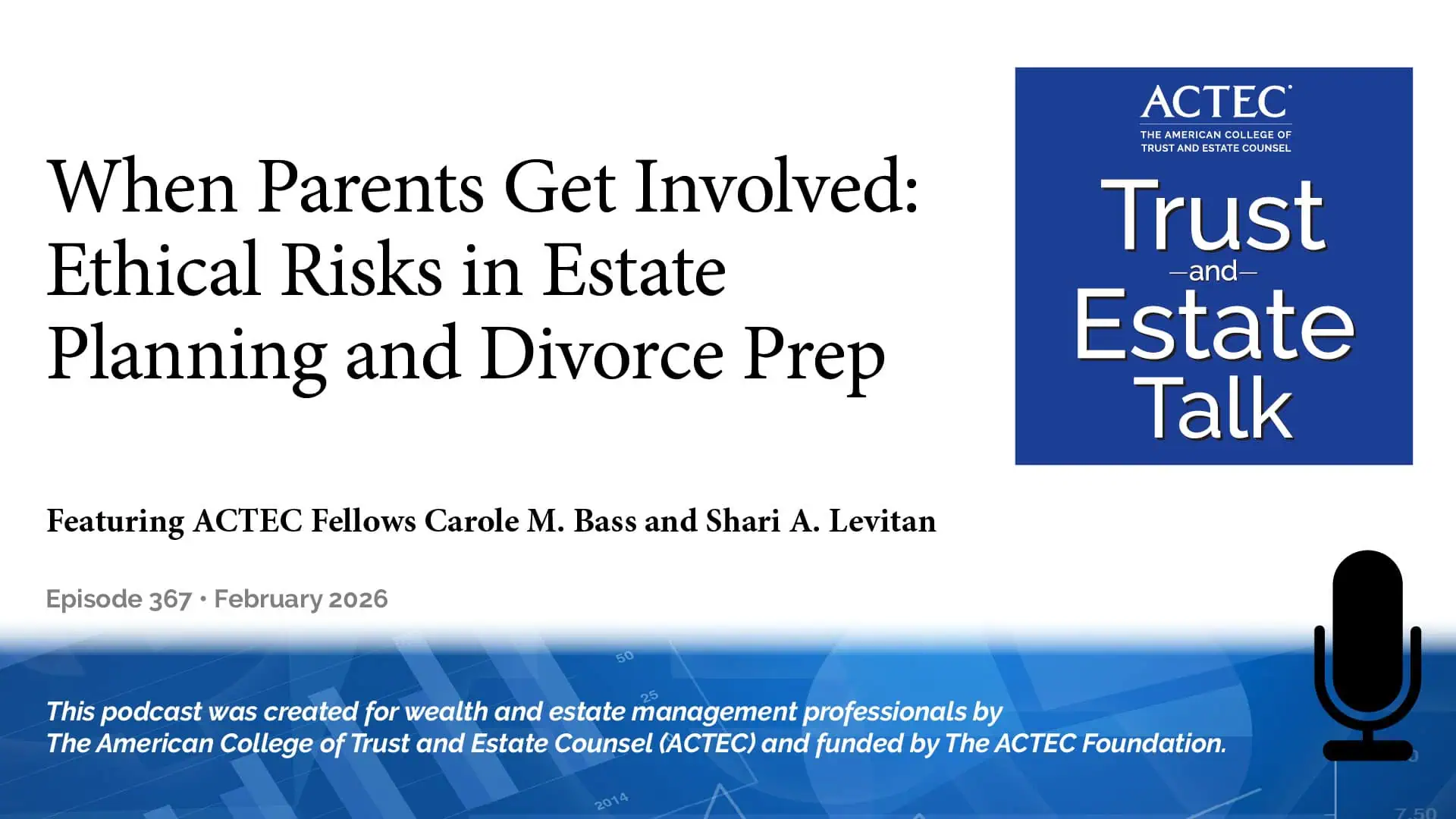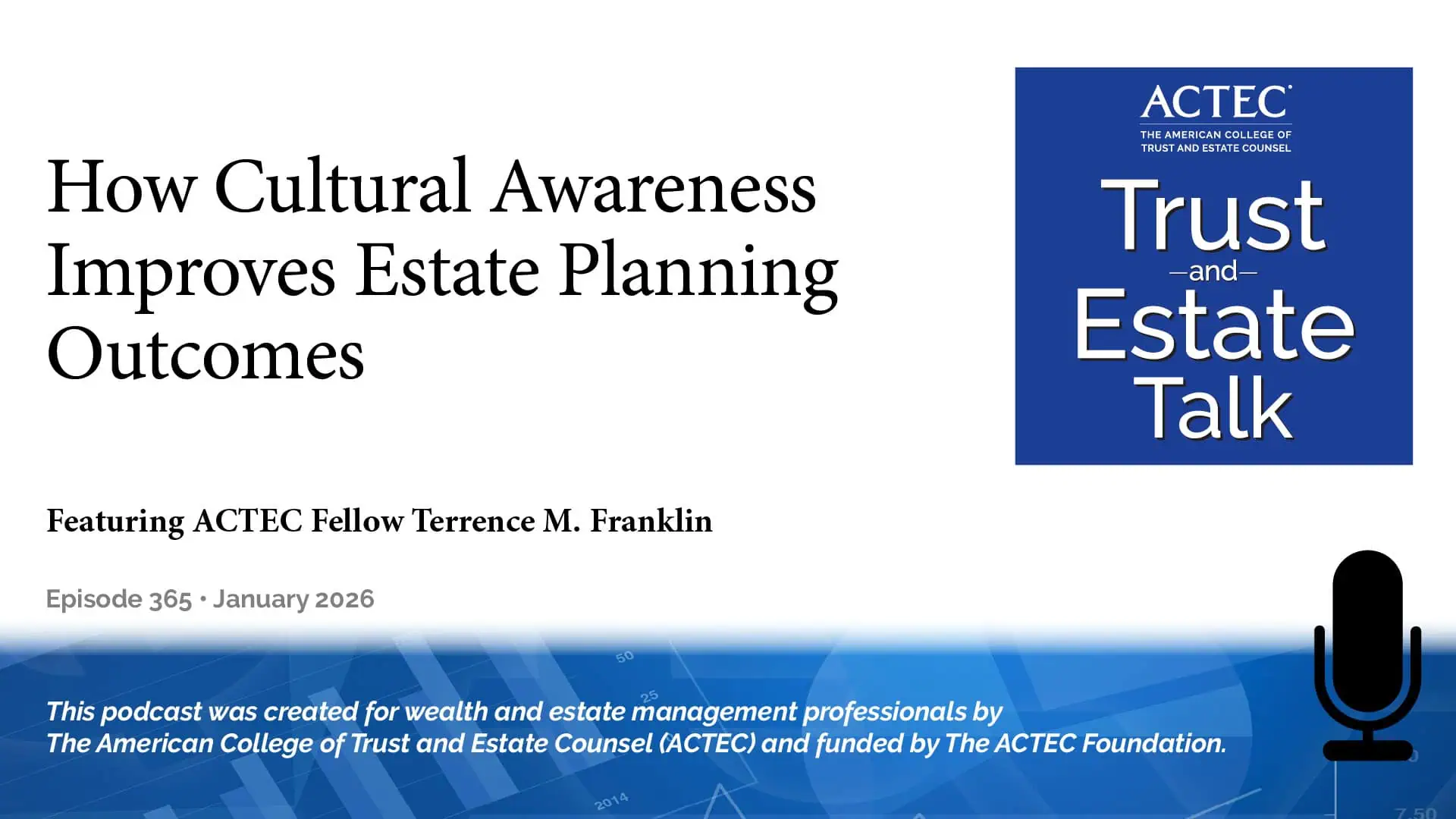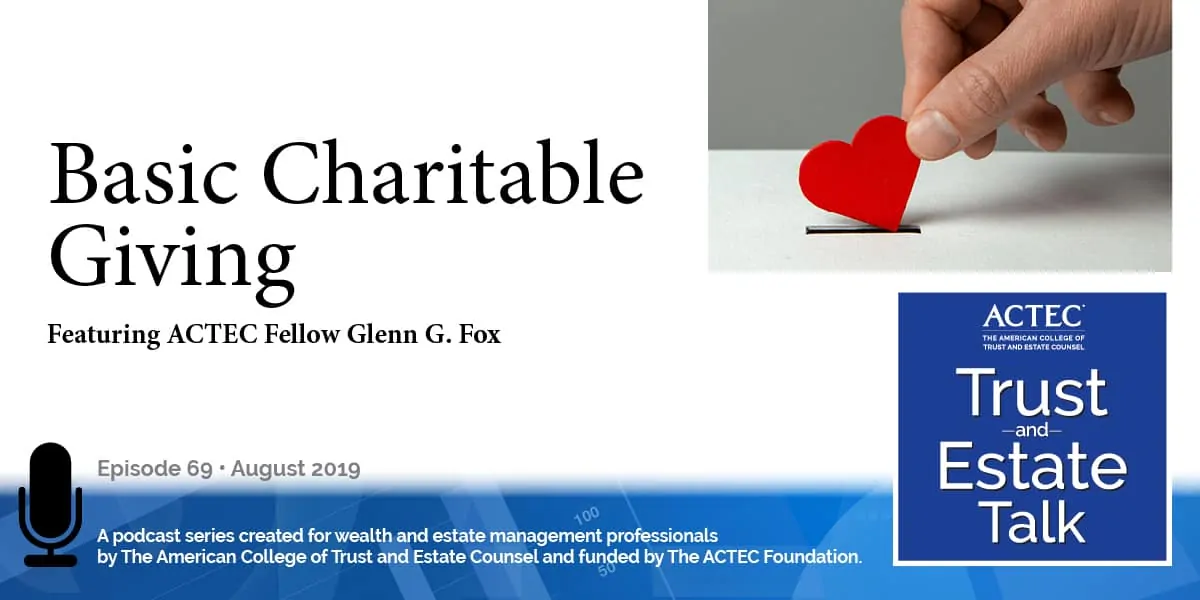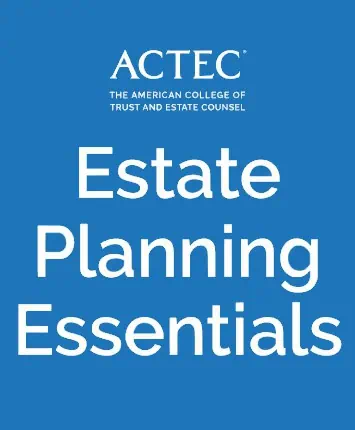Basic Charitable Giving
“Basic Charitable Giving,” that’s the subject of today’s ACTEC Trust and Estate Talk.
Transcript/Show Notes
This is Cynda Ottaway, ACTEC Fellow from Oklahoma City. What are the fundamentals of basic charitable giving? To answer that question, you’ll be hearing today from ACTEC Fellow Glenn Fox from New York City. Welcome, Glen.
Thank you. What I’d like to cover in the time we have today is an overview of charitable giving in the income tax context, the estate and gift tax context, and then just a general overview of how the differences between public charities and charitable foundations operate.
Charitable Giving and Income Tax
So, on the income tax side of things, the question that I think initially comes up is: how are your contributions deducted for income tax purposes? What are the factors that you need to consider? I would break that down into 4 factors to consider when determining the deductibility of an individual’s charitable contribution.
- First, what type of property are they contributing – cash, short-term capital gain property, long-term capital gain property? And, we’ll go into that.
- Second, what type of organization are they giving the property to? Is it being given to a public charity or is it being given to a private foundation? That’s the second thing that affects the deductibility of your contribution.
- The third thing that impacts the deductibility is: has the contribution been given to a corporation, trust or foundation that’s established under Section 501(c)(3) under US law? That’s the third factor that impacts your income tax charitable deduction.
- The fourth is that the donee organization to which you are contributing must be exclusively for religious, charitable, scientific, literary or educational purposes or set up for those purposes or must foster national or international amateur sports competition.
So, those are the four factors that we look at, and we are going to delve into each one of those a bit to give a sense of what the impact is. As I noted, the first thing that you look at is: what type of property you are contributing? If you’re contributing short-term capital gain property to the charitable entity, only your basis is deductible for income tax purposes. There are some exceptions for things like inventory, scientific property or computer equipment, but for example, if you are giving short-term capital gain property as let’s say marketable securities that were just purchased within the past year, you would only be able to deduct your basis – what you acquired the property for, even if it’s gone up in value tremendously. Long-term capital gain property generally, for gifts to a public charity, you will get the full fair market value deducted. So again, if those marketable securities have been held by you for a certain period of time, but beyond a year regardless of the period of time, and you contribute that property to a public charity, you’ll be able to deduct the full value of the property.
If you’re contributing the long-term capital gain property to a private foundation, only your basis is deductible unless you’re talking about publicly traded stock and gifts of tangibles. Otherwise, you’re limited to your basis if you’re giving property to a private foundation. As an example, again, if you’re giving marketable securities, you’d get the full fair market value, but if you’re giving stock in a closely held business to a private foundation you would be limited to your basis.
Now, there are also limitations on the timing of the deduction. The charitable deduction is limited to certain percentages of the donor’s contribution base, which is a defined term. It’s defined as the donor’s adjusted gross income without regard to any NOL (Net Operating Loss) carrybacks. The annual limitation can be 20 percent of your AGI (Adjusted Gross Income), 30 percent or 50 percent of your AGI, depending on what kind of property is donated. Excess contributions over the 20, 30 or 50 percent limit can be carried forward up to five years.
Now, how do you determine those contribution bases? The donation of cash or short-term capital gain property to a public charity – the individual donor may deduct up to 60 percent of his contribution base or offset up to 50 percent of his contribution base, his AGI. If you donate cash or short-term capital gain property to a private foundation, the person may deduct or offset up to 30 percent of their AGI. If you’re donating long-term capital gain property to a public charity, you may deduct up to 30 percent of your AGI and if it’s long-term capital gain property to a private foundation, you can offset up to 20 percent.
Everything we focused on up until now has been individual donations, just a small caveat for corporations. If a corporation is making a charitable contribution, it can only offset up to 10 percent of its AGI. For this reason, quite often we don’t see corporations taking the charitable deduction when they’re making a contribution. Instead, they will likely take the position that the contribution is a business deduction under Section 162 where they’ll actually get more bang for their buck, as it were. But there are circumstances where a corporation might just, for perhaps public relations purposes, want to take it as a charitable deduction.
Estate and Gift Tax Charitable Deduction
Now shifting a bit and focusing, again, more on the individual side of things, everything we’ve spoken about was focusing on the income tax charitable deduction. Taxpayers also need to consider the estate and gift tax charitable deduction as well. Obviously, for lifetime gifts they have to be thinking about the gift tax charitable deduction; for death-time gifts, the estate tax. If you’re making the deduction for income tax purposes during your lifetime, the question is: can I also make a gift tax charitable deduction at the same time? Currently, obviously, the lifetime exemption is $11.4 million for gifts to non-charitable people, but if you’re making a gift to a charitable institution, one that is set up for things that we’ve mentioned earlier – religious, charitable, scientific purposes — the $11.4 million exemption should not be utilized at all. For the charitable contribution to be deductible for US gift tax purposes, the gift must be to a corporation organized for these types of charitable purposes.
However, there’s an interesting caveat. Unlike the rules for income tax charitable deduction, where the contribution must be to a US entity, a US corporation or foundation, you can get the gift tax charitable deduction or the estate tax charitable deduction, even if it’s to a foreign charity. You would not get the income tax deduction, you would not be able to deduct it on your income tax return, but if you want to benefit a foreign charity directly — you can be, rest assured — that if you meet the requirements that I will talk about in a minute, that the contribution is not going to be subject to gift tax or estate tax when you die. It’ll be a discussion for another day on how you can get your cake and eat it too, that is, get the income tax and the gift tax deduction for foreign charities, but that, we don’t have time for today.
Foreign Charity Specifics
How do you make sure you get the gift tax charitable deduction when you make a contribution to a foreign charity? If you read the regulations here, they basically say the entity can be any kind of entity. It doesn’t have to be a US entity, but when you delve into the rules a little bit and you look at a part of the code that talks about the qualification of a charity, that’s Section 508 (d)(2)(b), it provides that gift and estate tax charitable deductions are not permitted if the entity has not notified the IRS that it’s applying for recognition as a 501(c)(3) organization. Most foreign charities will not have done that. This would give you pause as to whether or not your contribution will qualify.
However, there are two overriding provisions, and I’ll end with these, that will allow you to qualify the contribution to that foreign charity. Number one, if the foreign charity receives at least 85 percent of its support from non-U.S. sources, so you’re just a little bit in the 15 percent side, the contribution to that foreign charity will not be subject to gift or estate tax. The second way is making the contribution to a foreign trust that is committed to charitable purposes even if that trust has not gotten a tax exemption letter from the IRS so long as the trust meets all of the requirements of a private foundation. Those are the two ways you can get the charitable deduction for estate and gift tax purposes when you give funds to the foreign charity.
Thank you, Glenn, for walking us through the rules around basic charitable giving.
Thank you, Cynda.
This podcast was produced by The American College of Trust and Estate Counsel, ACTEC. Listeners, including professionals, should under no circumstances rely upon this information as a substitute for their own research or for obtaining specific legal or tax advice from their own counsel. The material in this podcast is for information purposes only and is not intended to and should not be treated as legal advice or tax advice. The views expressed are those of speakers as of the date noted and not necessarily those of ACTEC or any speaker’s employer or firm. The information, opinions, and recommendations presented in this Podcast are for general information only and any reliance on the information provided in this Podcast is done at your own risk. The entire contents and design of this Podcast, are the property of ACTEC, or used by ACTEC with permission, and are protected under U.S. and international copyright and trademark laws. Except as otherwise provided herein, users of this Podcast may save and use information contained in the Podcast only for personal or other non-commercial, educational purposes. No other use, including, without limitation, reproduction, retransmission or editing, of this Podcast may be made without the prior written permission of The American College of Trust and Estate Counsel.
If you have ideas for a future ACTEC Trust & Estate Talk topic, please contact us at ACTECpodcast@ACTEC.org.
Latest ACTEC Trust and Estate Talk Podcasts

When Parents Get Involved: Ethical Risks in Estate Planning and Divorce Prep
When parents join prenup or divorce planning, ethical risks follow. ACTEC Fellows explore privilege, conflicts, and protecting the attorney-client relationship.

Useful But Overlooked Trusts: A Planner’s Guide to When and How to Use Them
Explore overlooked trusts—including HEETs, alimony, voting, and blind trusts—and when estate planners should use them to address complex client needs.

How Cultural Awareness Improves Estate Planning Outcomes
How cultural awareness improves estate planning outcomes, with insights on the racial wealth gap and strategies for more effective, inclusive client guidance.



